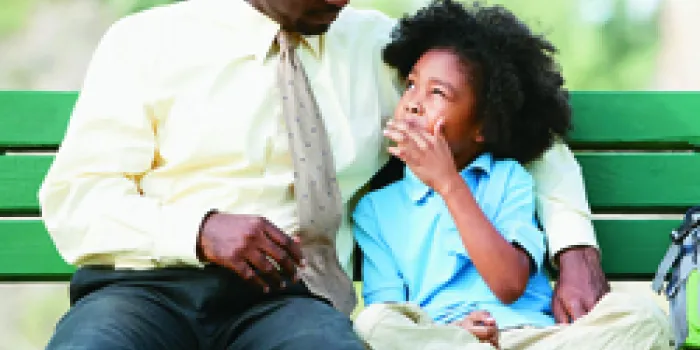Treasa Chidester, 36, a nurse and attorney in Washington, DC, has known since childhood that she is a hemophilia carrier. For many years, she planned on having children, because she figured she would be a good parent whatever the challenges. Right before she got married in 1994, she paid a visit to her father’s hematologist to go over what to expect if she became pregnant. Instead of information, she got a rebuke: “He said, point blank, ‘You should never have children; you should adopt.’”
For the next decade, Chidester and her husband were so frightened of the unknown that they delayed having children. Then she became pregnant unexpectedly. A diagnostic test for chromosomal abnormalities early in her pregnancy revealed Chidester was carrying a boy with hemophilia.
The diagnosis dredged up fresh memories of the doctor’s warning. “I felt extremely guilty that I knew that I could pass it on, that I could have prevented it, but I didn’t,” says Chidester.
A bleeding disorder often brings with it a lot of guilt, that feeling of being responsible for doing—or not doing—something that contributed to someone else’s problems. In the case of hemophilia, moms may feel guilty for passing on the gene to their sons. Dads may feel guilty for causing their daughters to be carriers. Both parents at times may feel guilty for centering more of their attention on the child with the bleeding disorder than on their other children. And adults with hemophilia may feel guilty for being a burden to their spouse, parents or children. These feelings of “unreal guilt,” in which the person didn’t do anything wrong and isn’t at fault, can be just as paralyzing as “real guilt,” in which someone feels guilty for a situation over which he or she had control.
Chidester looks back on her guilt as a way of dealing with grief. “I grieved over the loss of a perfect child when I pictured myself as a mother,” she says. “I didn’t envision that my kid was going to have a port and I was going to have to give him medicine three times a week into a vein.”
While many parents and family members experience guilt when dealing with a bleeding disorder diagnosis, there are ways to get help and get off the guilt-filled path.
Guilt as Part of the Grieving Process
Jolene Philo, author of A Different Dream for My Child: Meditations for Parents of Critically or Chronically Ill Children, says guilt is a natural part of the grieving process when a child is born with a genetic disorder. The five stages of grief, introduced in Elizabeth Kübler-Ross’ classic book On Death and Dying, are: denial, anger, bargaining, depression and acceptance. Originally geared toward people with terminal illnesses, the stages have since been applied to people going through any catastrophic event, including having a child with a chronic illness. Not everyone experiences all the stages, and some people may skip over some or experience them in a different order.
Parents may feel guilt during the depression stage of the grieving process, when they may begin to grasp the reality of their child’s condition, yet be ashamed they’re still feeling sad about it. “The guilt and the grief get all mixed up. Parents don’t recognize that truly what they’re dealing with is grief and that they are allowed to grieve,” says Philo. Her son has a birth defect.
Some parents may need help acknowledging there’s even a problem, says Sue du Treil, PhD, a social worker and adjunct assistant professor at the Louisiana Center for Bleeding and Clotting Disorders at Tulane University Medical School in New Orleans. Social workers at hemophilia treatment centers (HTCs) are trained to identify when parents are struggling. “If we see parents who are sad, but not able to even ask questions about their child, we might talk to them about some of the things we’re seeing in a way that’s not accusatory or putting them down,” she says.
Du Treil often refers struggling parents to the Parents Empowering Parents (PEP) retreat, a weekend gathering available across the country for parents of children with bleeding disorders. Those who’ve worked through their guilt and depression provide advice, support and positive reinforcement to other parents. PEP is supported by Bayer and Pfizer.
When people are feeling guilty, they need to share their feelings in a support group or with a counselor or someone else they trust. Once parents can talk about their guilt, they can begin to work through it, says du Treil. “To be willing to look at a feeling, plan a way to resolve it and then act on it—those are coping skills,” she says. There are many ways to come to terms with guilt. “If your plan doesn’t work, you try a new plan or go and ask for more help.”
Forgiving Yourself
Left untreated, guilt can get in the way of good parenting, says du Treil. “If parents don’t feel good about themselves, they won’t feel capable in other areas of their lives.” Forgiving themselves helps parents cope with other difficult feelings. Then they can listen better to their children and can play an active part in their child’s life, she says.
 While pregnant, Chidester sought support from two moms with sons with hemophilia that she’d met in a Yahoo discussion group for families of people with hemophilia. They explained to Chidester how much treatment had improved since her father was young. One of the women invited her family to a picnic for families with children with hemophilia. Chidester saw many boys there with hemophilia riding bikes and playing together. “That’s when my husband and I thought, ‘Oh, this is not going to be so bad.’”
While pregnant, Chidester sought support from two moms with sons with hemophilia that she’d met in a Yahoo discussion group for families of people with hemophilia. They explained to Chidester how much treatment had improved since her father was young. One of the women invited her family to a picnic for families with children with hemophilia. Chidester saw many boys there with hemophilia riding bikes and playing together. “That’s when my husband and I thought, ‘Oh, this is not going to be so bad.’”
Chidester and her husband now have two boys, Jacob, 6, and Maximo, 1. Both have severe hemophilia A. Deciding to have a second child was much less stressful. “I saw how normal our life ended up being,” she says. By the time Jacob was two and had a port, Chidester’s guilt had disappeared. “We had settled into a normal routine. He was able to go to school and swim in the pool and play on the jungle gym—all these things I was afraid he wouldn’t be able to do.”
Controlling the Uncontrollable
Kari Burke-Romarheim, 32, associate pastor at Bethel Lutheran Church in Hudson, Wisconsin, knew she was a hemophilia carrier. After going through genetic counseling, she and her husband, Vidar, decided to have children because they believed hemophilia was a minor issue.
But when her first son, Andreas, 3, was diagnosed with moderate hemophilia A at birth, guilt and fear surfaced. Burke-Romarheim wondered if her son would lead a normal life or if other kids would make fun of him. “I felt guilty for all of these unperceivable things that probably will not even happen.”
Sometimes, parents feel guilty when caring for a child with hemophilia becomes overwhelming and  they don’t feel they’re capable, Philo says. Similarly, if a child has a bleed, parents may feel inadequate because they didn’t prevent it or may blame themselves because they can’t prevent the pain.
they don’t feel they’re capable, Philo says. Similarly, if a child has a bleed, parents may feel inadequate because they didn’t prevent it or may blame themselves because they can’t prevent the pain.
Burke-Romarheim says blaming herself gave her a sense of control over an uncontrollable situation. But the guilt didn’t last forever. As she learned more about hemophilia, had more experience as a parent and got involved in the bleeding disorders community, she didn’t feel so overwhelmed. Talking about her feelings with a nurse at Children’s Hospital in Minneapolis also helped. “She gave me reassurance that we can definitely handle having children with hemophilia, and there would be support out there for us,” says Burke-Romarheim. “We wouldn’t be alone in it.”
Burke-Romarheim and her husband had another son, Lukas, now 8 months old. He also has moderate hemophilia A.
Dads Feel Guilty, Too
Mothers aren’t the only ones who feel guilt. Fathers struggle with guilt of their own, often around financial issues. Du Treil recalls a dad crying uncontrollably in her office after his son had a major bleed that was so expensive to treat that the small company the father worked for lost its insurance. The man left his job because he felt responsible for his co-workers’ loss of insurance coverage.
Mickey Price, 36, of Lancaster, California, has severe hemophilia A, HIV and hepatitis C. He battles guilt and depression because he can’t be as active as he’d like with his daughter, Kaelee, 2. Sometimes his knee replacement holds him back; other times he needs to infuse. There have been times Price has played too hard, then had to deal with the consequences of a bleed for the next few days.
Price, who is a Federal Aviation Administration-certified airplane equipment repairman, says the best medicine for working through guilt comes from his faith in God and being active in his church. “About six years ago, I started going regularly and committing myself to volunteering there,” he says. He serves as an usher. “I go to church, and I realize my hemophilia is part of God’s plan.”
A Blessing, Not a Burden
Parents who feel guilty for passing on a bleeding disorder to their children sometimes worry that their kids will resent them later. But often, adult children point out the opportunities they had and the people they met because of their bleeding disorder.
Du Treil often shares this quote with parents from a 2004 study from the World Federation of Hemophilia: “The people who best enable women who are carriers to come to terms with their feelings of guilt are their sons with hemophilia.”
One such guilt lifter is John Vieke, 28, of Anderson, Indiana, who has severe hemophilia B and hepatitis C. He and his wife have a daughter, Emma, 2. “Although I had hemophilia, I still lived a normal life,” says Vieke, who works as a deputy sheriff in the Madison County jail. “In fact, I got to do a lot of things that I wouldn’t have normally been able to do if I didn’t have hemophilia.”
Vieke has traveled to NHF Annual Meetings in New Orleans, Orlando and Chicago. He also participated in a weeklong workshop in San Francisco that trained young people with hemophilia to be leaders in the community. At teen leadership camps in West Virginia, he went whitewater rafting. Some of his best friends are men with hemophilia whom he met at monthly men’s group meetings.
Kerry Fatula is a mother of four sons. Three of them have severe hemophilia A: Paul, 22; Nathan, 20; and Collin, 8. Stephen, 11, is unaffected. Fatula was the executive director of the NHF Western Pennsylvania Chapter until her family relocated to Kodiak, Alaska, in July 2011.
Kerry lived relatively guilt-free for years, happy with her family and her life. But that changed when an article about her family’s difficulty finding health insurance was published in 2008 in The Washington Post. Kerry wasn’t prepared for the onslaught of hateful comments about how irresponsible she was for choosing to have multiple children with a genetic disorder. “I felt a lot of guilt that I had not experienced before,” she says. One of the nasty comments that particularly bothered her questioned how a “rational, intelligent” person could knowingly inflict a debilitating disease on another human being. “That’s when I felt like I had to ask my kids, ‘Do you feel I intentionally inflicted this terrible thing on you?’ I had never even considered that before.”
But Nathan told his mom he’s happy with the way his life turned out. “He said there’s so many things he’s done and experienced that he would not have if he didn’t have hemophilia,” Kerry says. “Hemophilia has really shaped who he is and given him lots of opportunities.” Nathan recently graduated from high school and is working toward a career in information technology.
Unaffected Siblings
Unaffected siblings of children with bleeding disorders can also feel guilty, du Treil says. “When I’m talking to siblings, I’ll say, ‘It’s OK to feel mad because you feel like you’re not getting enough attention,’” she says. It’s important for siblings to discuss these feelings with their HTC social worker, parents or another trusted adult.
Jesse Schultz, 23, graduated from Indiana University in Bloomington in December 2010 with a bachelor’s degree in management. Growing up in Louisville, he wanted to get infusions like his brother, Michael, 24, who has moderate hemophilia A from a spontaneous mutation. But his mother explained to him that the infusions were necessary to help Michael with his hemophilia and that Jesse didn’t need them.
 “In the beginning, the jealousy was definitely there as Michael got more attention during the infusion process,” Jesse says. “However, early on, Mom engaged me in each infusion.” She let Jesse warm up the factor or flick the bubbles out of the syringe. “These little responsibilities made me feel a part of the process and gave me a greater connection with Michael.” Jesse and Michael also grew closer attending NHF Annual Meetings together.
“In the beginning, the jealousy was definitely there as Michael got more attention during the infusion process,” Jesse says. “However, early on, Mom engaged me in each infusion.” She let Jesse warm up the factor or flick the bubbles out of the syringe. “These little responsibilities made me feel a part of the process and gave me a greater connection with Michael.” Jesse and Michael also grew closer attending NHF Annual Meetings together.
Though they attended different colleges, the Schultz brothers are still very close. As Jesse got older, he not only looked up to his brother, but also looked out for him. “If he was starting to hurt, I was able to be there to help him, to say, ‘Hey, Michael, maybe you need to infuse,” Jesse says.
Michael’s hemophilia also made Jesse a stronger, more compassionate person. “I know what other people are going through and what a family of a person with a chronic illness has to do to live a normal life,” says Jesse.
Be Kind to Yourself
As people in the bleeding disorders community begin to discuss their guilt with social workers, family members and other families in the bleeding disorders community, they will begin to understand the source of it. As they do, du Treil says, it’s important to find something to counteract the guilt, such as recalling why they wanted children in the first place. “Maybe it’s because you want to give life to this child, and you know that you can help the child cope with their illness and live a very productive, fulfilling life,” says du Treil. “Parents need to remind themselves of that. Then they can be kinder to themselves about this guilt.”

